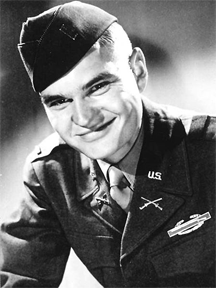By Austin Alexander
It was in the army, Paul Fussell recalled with characteristic irony, that he discovered his calling. As a bookish twenty-year-old charged with leading an infantry platoon in France during the final, bitter winter of World War II, he found that he could ably lecture his men on everything from reading a map to operating a flamethrower. Honing this talent for teaching by preparing his men for combat, Fussell divulged in his 1982 essay “My War,” nearly forty years after the shooting stopped, was ample preparation for a career as a college professor.
To be sure, however, the war would shape the life’s work of this acclaimed literary historian and social critic, who died in May at age 88, in even more dramatic ways. It took only a few days on the front for the naively optimistic young Fussell to realize that his romantic appreciation for the Allied cause could in no way be reconciled with the absurd realities of modern combat. The Second World War may have been conceived as just and necessary, but in practice it was just as cruel, disorienting and senselessly brutal as all conflicts that had come before it.
It was from this vantage point, overlooking the No Man’s Land between expectation and reality in wartime, that Fussell’s signature skepticism and acerbic wit sprouted. It should come as no surprise then that the event he singles out in “My War” as marking his complete disillusionment was “less apocalyptic than shabbily ironic”: After becoming lost in the French countryside and enduring a night of intense shelling on an exposed hillside, Fussell and his company awoke at first light to find themselves surrounded by the marble-colored corpses of teenage German soldiers killed a few days earlier. He writes, “My adolescent illusions, largely intact to that moment, fell away all at once, and I suddenly knew I was not and never would be in a world that was reasonable or just.” To the embittered soldier turned scholar, this scene which “sorted so ill with modern popular assumptions about the idea of progress” offered nothing less than indisputable empirical proof of the irrationality of human behavior and the “shakiness of civilization.”
The misanthropic skepticism that Paul Fussell carried away from this and other experiences in the Second World War may have been extreme, but it provides the basis for the originality and incisive clarity of his scholarly works. Fussell used his firsthand understanding that the center does not hold to do much more than rail against the myth-making impulses that make war seem attractive to young men; he used this knowledge to forge a career by undermining the official discourses on a variety of academic topics. In Class (Summit Books, 1983), a brilliant and sweeping study of the American social system, Fussell discredits the rosy and inoffensive idea that the United States possesses a fluid, classless society. Separating the hard truths from the glossy falsehoods, his research seems to suggest, requires little more than an open mind and an open eye.
In Samuel Johnson and the Life of Writing (Harcourt Brace Jovanovich, 1971), a thorough analysis of the life and works of the eighteenth-century literary Renaissance man, Fussell similarly blasts apart the human predilection toward convenient and familiar forms. Aware that modern assumptions about what constitutes literature are inexplicably narrow, Fussell treats the legal briefs and advertisements that the eccentric Johnson penned during his lifetime with the same careful analysis as he does Johnson’s poems and plays. It is, of course, this very same impulse that guides Fussell to begin The Boy Scout Handbook (Oxford University Press, 1982), his thoughtfully ironic literary critique of the popular manual for young, outdoorsy do-gooders, with the sentence “It’s amazing how many interesting books humanistic criticism manages not to notice.”
But of course it was in his study of the cultural impact of World War I, The Great War and Modern Memory (Oxford University Press, 1975), which won Phi Betta Kappa’s Ralph Waldo Emerson Award in 1976, that Paul Fussell was most deftly able to weave together his love of language and hatred of militarism and convention. There is little question as to why Fussell felt such an affinity for this largely forgotten conflict: It had “reversed the Idea of Progress” in the West just as his own combat experience had forced him to second-guess the merits of modernity. With this in mind, it seems that only a wary and skeptical combat veteran of Fussell’s caliber, with firsthand knowledge of the grim ironies of doing battle, could trace the currents of disillusionment emanating from the First World War with such depth and accuracy. As Fussell plainly admits in “My War,” the suspicious outlook and caustic voice of the speaker in all his writings are really just that of a “pissed-off infantryman.”
Austin Alexander is a senior at Clark University majoring in history. Clark is home to the Lambda of Massachusetts chapter of Phi Beta Kappa.




